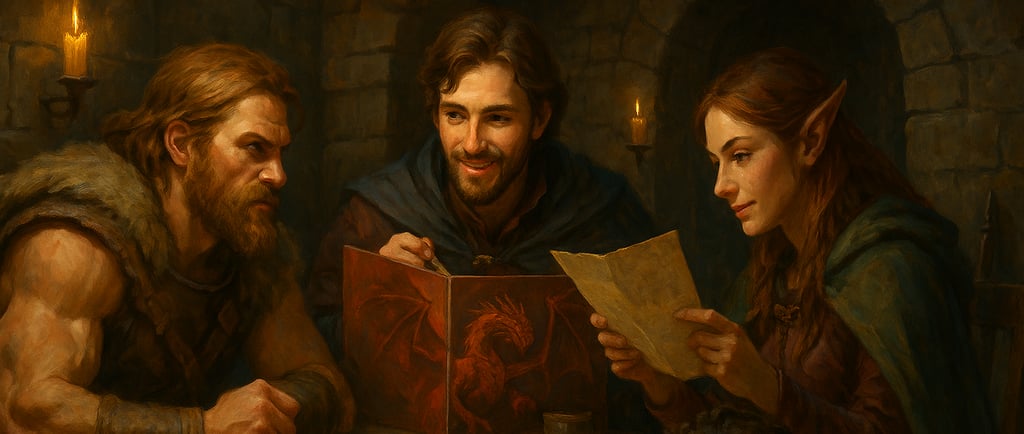Dungeons & Dragons: The Most Unexpected School of Life
When people hear “Dungeons & Dragons,” they often picture dice, dragons, and grown adults pretending to be elves. And sure, all of that is true.
DUNGEONS AND DRAGONSWORLDBUILDING
Marketa
8/17/20252 min read


But hidden beneath the goblin-slaying and ale-drinking is something far more interesting:
a quiet, powerful engine of personal growth.
Because D&D doesn’t just teach you how to play.
It teaches you how to live.
1. The Art of Communication – or How to Get the Barbarian to Stop Punching Things
D&D is, at its core, a group storytelling exercise. And storytelling requires words – careful ones, bold ones, persuasive ones.
Players learn to
· Express themselves clearly
· Negotiate with teammates
· Listen actively
· Adapt to unexpected dialogue twists (or fireballs)
You start learning how to speak so others understand – and, more importantly, how to listen so others feel heard. In a world drowning in noise, that’s a rare and vital skill.
2. Strategic Thinking – AKA “Maybe We Shouldn’t Fight the Hydra Head-On?”
Every encounter in D&D requires problem-solving:
Do we fight or sneak?
Bribe or blackmail?
Split the party (don’t) or stick together?
In making these decisions, players practice
Critical thinking
Risk assessment
Consequential reasoning
Creative improvisation
You’re basically running simulations for real-world dilemmas, but with more swords and fewer lawsuits.
Short on time but love clever encounters? Our ready-made side quests come with balanced puzzles, moral dilemmas, and combat setups – so you can spend less time planning, and more time watching your players panic.
3. Empathy Through Roleplay – Stepping Into Someone Else’s Skin
In D&D, you’re not just acting like someone else – you become them, with their traumas, flaws, loyalties, and dreams.
That experience breeds
Emotional intelligence
Empathy
Moral complexity
You learn to see the world through another's eyes – even if those eyes belong to a half-orc cleric with mommy issues and a drinking problem.
4. Patience, Collaboration, and the Magic of Long-Term Payoff
Campaigns can last weeks, months, even years. And in a culture obsessed with instant gratification, that’s radical.
D&D teaches
Commitment
Teamwork
Dealing with different personalities
Delaying gratification for a better future
You don't always get the treasure today. Sometimes you get it three sessions later – if the rogue doesn’t steal it first.
5. Confidence and the Courage to Be Seen
There is something deeply vulnerable about roleplaying in front of others. You’re making voices. You’re improvising. You’re failing, sometimes spectacularly.
But then you realize
No one laughed at you.
You can think on your feet.
Your story mattered.
That moment – that spark of confidence – doesn’t stay on the game board. It walks out the door with you.
Want to help others experience that, too? We're working on beginner-friendly D&D guides for new DMs – no gatekeeping, no stress, just great storytelling made easy.
So Yes – It’s “Just a Game.”
But so is life.
And every time you sit at that table, you’re practicing the skills that make the real world a little more manageable:
Speaking with clarity. Choosing with purpose. Listening with care. Creating with courage.
That’s the secret magic of D&D.
Not the spells.
Not the monsters.
But the people we become when we dare to play.
Want leadership training, emotional depth, social resilience, and creativity workshops? Start a D&D campaign.
Side effects may include dragons, deep friendships, and one unforgettable goblin NPC named Greg.
